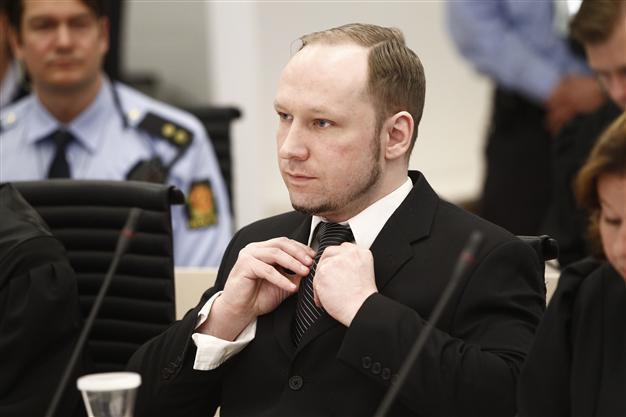Two other cells prepared to attack Norway: Breivik
OSLO - Agence France-Presse

AFP Photo
Right-wing extremist Anders Behring
Breivik, who killed 77 people in twin attacks in
Norway last July, told an Oslo court Wednesday that two other cells were prepared to attack the country.
When prosecutor Inga Bejer Engh asked if Norwegians should truly fear attacks from two other cells, Breivik answered: "Yes."
Breivik was obstinate and uncooperative as prosecutors questioned him on his alleged "militant nationalist" contacts when he took the stand on today.
"I know that you will try to delegitimize me for the next two hours. We may as well skip over that and get to the conclusion," Breivik said in an outburst during questioning by prosecutor Inga Bejer Engh.
Breivik had during the first two days of his trial appeared calm and collected as he asked the court to acquit him yet making clear he would "have done it again", and readily answering questions from prosecutors and chief judge Wenche Elizabeth Arntzen.
But on Wednesday, he quickly grew frustrated with Engh's line of questioning over his claims that he had contacts with "militant nationalists" in Liberia and London.
In his 1,500-page manifesto published online the day of the attacks, the 33-year-old rightwing extremist said he was a member of a network of militant nationalists, the Knights Templar, that he founded with three other people in London in 2002.
Norwegian police have never been able to prove its existence.
On Wednesday, he told the court he had been in contact on Internet in 2001 with a person abroad who was instrumental in the creation of the Knights Templar.
He also said he went to Liberia to meet a militant nationalist Serb, but refused to provide his name or details about the meeting.
"I do not want to provide information that could lead to the arrest of others," he said.
As Engh asked him why militant nationalists would want to have contact with him, Breivik asked her: "May I ask what the purpose is .. of your way of reasoning?" "You are trying to sow doubt about whether the network exists .. that is your purpose. I hope you will put less weight on ridiculing me and focus more on the issue," he said.
"I am interested in casting light on the radicalization process, but I don't want to make your delegitimization strategy easier for you," he said.
She persisted with her line of questioning.
"I don't want to say anything about that... I don't want to say more about Liberia... I don't want to say more about it," Breivik repeated, forcing Engh to finally read from his police interrogation transcript.
The judge warned Breivik that if he continued to refuse to answer, it could be used against him.
A day earlier Breivik read a 73-minute statement to the court -- after being granted 30 minutes to speak -- outlining his Islamophobic and anti-multicultural ideology, which he says explains why his attacks were "cruel but necessary." Reading from a prepared text, Breivik said he had bombed government buildings in Oslo before shooting down 69 people -- most of them teenagers -- on the nearby Utoeya island to defend "ethnic Norwegians" from rising multiculturalism, insisting he "would have done it again." The confessed killer has claimed "legitimate defence," and rejected any criminal guilt.
On Tuesday, he told the court he had toned down his rhetoric and tried to play down his earlier antics, explaining he was intent on proving his sanity and showing his comprehensive ideology was not the rantings of a lunatic.
If found sane, Breivik risks a 21-year jail term, which could then be extended indefinitely if he is still considered a threat to society. If found insane he could be sentenced to closed psychiatric care, possibly for life.
Two psychiatric evaluations have drawn contradictory conclusions on his sanity, and ultimately it will be up to the judges to rule on them when they deliver their verdict sometime in mid-July.
